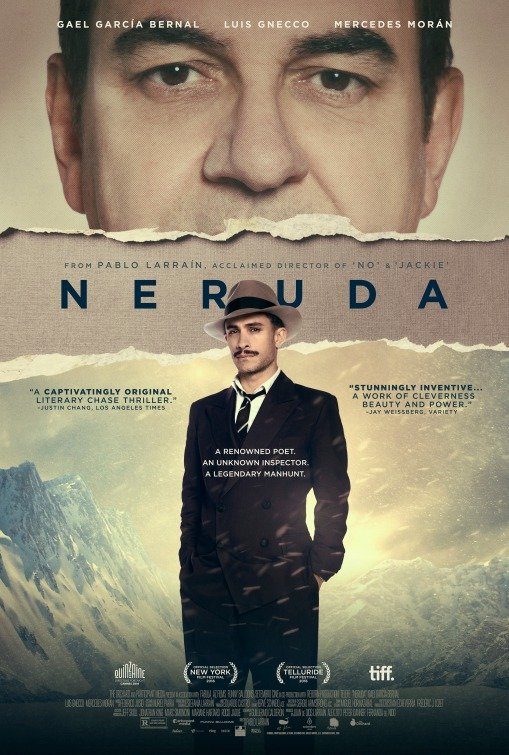“Celebrating a Communist, Stalinist Stooge”

| None | Light | Moderate | Heavy | |
|---|---|---|---|---|
| Language | ||||
| Violence | ||||
| Sex | ||||
| Nudity |
What You Need To Know:
NERUDA has some captivating moments, but the movie comes across as sketchy and sometimes pretentious. Many (if not most) of Neruda’s poems aren’t political, but the movie concentrates on his more political poetry. NERUDA doesn’t always give a flattering portrait of its subject. It does, however, encourage viewers to side with Neruda’s leftist leanings, although it also generates some sympathy for the dogged but misguided policeman on his trail. NERUDA is also marred by foul language and explicit lewd content.
Content:
(HHH, CoCoCo, ACapACapACap, AC, PC, Ho, LL, V, SS, NN, AA, D, M) Very strong humanist, communist, anti-capitalist worldview, although there are some pointed criticisms of some leftists, but especially leftists who lack courage and who are, in reality, phony with no integrity, plus a politically correct scene with a cross dressing homosexual who speaks highly of a leftist politician, activist and poet who was more kind and compassionate to him than most other people; 10 or 11 obscenities (about three “f” words); man is hit in back of head and wanders around dazed in the snow until he collapses and dies, some gunshots, man takes target practice; strong sexual content includes two scenes where married man is having a party with nude prostitutes, a couple other brief and light sexual references and cross dressing man talks passionately about how a leftist politician understood him and treated him respectfully, unlike others; images of upper and rear female nudity; alcohol use and brief drunkenness; smoking; and, lying, cheating, oppression, man just leaves his second wife.
More Detail:
The movie focuses on 13 months in Neruda’s life, beginning in January 1948. It opens at a private meeting of the Chilean senate, where a politician lambastes Neruda for criticizing the new president, which Neruda helped elect, but who’s fast becoming just another dictator. Neruda answers tit for tat while also praising Stalin’s Soviet Union for defeating Hitler’s Germany.
At a party at his house, Neruda learns that the Communist Party, of which he’s a member, is going underground because of the president’s persecution. During the party scenes, an unseen narrator satirizes the communists and leftists at Neruda’s party, saying, among other things, that, if Chile ever did have a Bolshevik revolution like the Soviet Union, these people would be the first to run away.
Cut to Neruda giving another short speech, in the senate chamber. Afterwards, he tells the reporters that oppression has come to Chile.
As the new government starts relocating people into concentration camps, Neruda and his second wife, Delia, go underground. Chasing them is a tenacious police inspector, who turns out to be the movie’s narrator. Neruda, however, decides to turn the chase into a great hunt by goading the policeman. In doing so, both men are transformed, and reality is turned upside down.
NERUDA has some captivating moments, but, unless you know something about the man’s biography, the movie across as sketchy and somewhat pretentious. With a nod to the poet inside Pablo Neruda, the movie tries to be end on a poetic, provocative note. However, it ultimately doesn’t quite work despite the professional filmmaking and acting.
Many, if not most, of Neruda’s poems are not political. Like many poets, he often writes about love and lovers. However, he also writes about inanimate things, such as his striking poem “Ode to the Lemon,” which consists of about 20 lines of various descriptions of a lemon, including its pungent taste, which he describes as “the most intense liqueur of nature.”
That said, the movie repeatedly links all of Neruda’s poetry with his radical communist views (apparently, the movie focuses on Neruda’s more political poems, particularly one of his most acclaimed works, an epic, lyrical poem called “Canto General”). As such, despite the early criticism of Neruda and his fellow travelers by the narrator, the movie has a strong humanist, anti-capitalist, communist worldview. NERUDA doesn’t always give a flattering portrait of its subject. For instance, Neruda cavorts with naked prostitutes in a couple scenes. The movie’s ending, however, encourages viewers to side with Neruda’s leftist leanings, although it does generate some sympathy for the dogged but misguided policeman on his trail.
What the movie neglects to tell viewers, though, is that Neruda himself was a big fan of the Soviet Union’s brutal communist dictator, Joseph Stalin, who murdered more people than even Hitler. Needless to say, when the murderous crimes of Stalin were finally revealed for all to see, Neruda reportedly was very embarrassed by his earlier support of Stalin. Of course, those new revelations didn’t stop other leftists from continuing to idolize Neruda’s communist views. For example, if Neruda was so wrong about Stalin, maybe was wrong about all his other leftist, communist positions! Naturally, this movie doesn’t really deal with this problem and avoids it. In fact, the movie ends with Neruda finally escaping South America and arriving in France.
NERUDA contains some strong foul language. As noted above, there is also some explicit lewd content and extreme but brief nudity.


 - Content:
- Content: 

